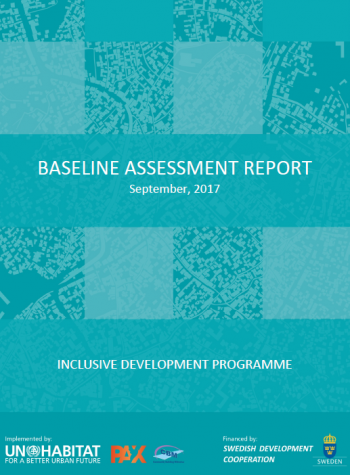- Media Center
 Baseline Assessment Report
Baseline Assessment Report- Fostering inclusive urban planning trough urban regeneration and presentation of the archeological site in Prizren
- Socio-economic impacts of COVID-19 in Kosovo municipalities and businesses
- Guidelines for Developing and Implementing a Sustainable Urban Mobility Plan in Kosovo’s cities – FIRST EDITION
- The evaluation report of the Municipal Development Plan of Vushtrri, which is in function of drafting the Municipal Zoning Map is published!
- GIS at the municipal level: the product of the cooperation of the Collegia of Directors for Spatial Planning and UN-Habitat is published!
- The report from the Municipal Visioning Workshop for the Municipalities of North Mitrovica and Zvecan!
- The evaluation report of the Municipal Development Plan (2017-2025) of Skenderaj/Srbica
- Annual Report of the Collegium of Spatial Planning within the Association of Kosovo Municipalities (AKM)
- Neighborhood Based Plan Deliberation (NBPD) for Mitrovica South
- Regional Visioning Workshop Report
- MDP Evaluation Report Mitrovica South
- Evaluation of Municipal Development Plan Report
- Gender Analysis in north Kosovo and concerned local authorities
- Baseline Assessment Report Summary
- Baseline Assessment Report ANNEX
As part of the inception phase of the programme (September 2016 – August 2017), a comprehensive baseline assessment of the local governance environment is being rolled-out with a view to further understand the current situation and capacities at all levels and calibrate the scope of work/ support to be provided in the core implementation phase of the programme, plus devise/ refine related baseline, targets and indicators in agreement with all the parties. The baseline assessment will also serve both as an internal monitoring instrument for partners in the programme, benchmarking the current state of municipal and civil society capacity so that targets can be established for progress over the course of programme implementation; and as a means of identifying current challenges and devising responsive mechanisms on how to address them.
The assessment is several-fold and examines municipal and civil society capacities and practices, public perception on a range of planning-relevant topics, it also entails a gender analysis for north Kosovo. The municipal assessment is made against Kosovo’s legal framework relevant for planning functions and service delivery at the municipal level and will provide the ground for organizational and professional/community development for enhanced city planning and management, as well as joint service delivery in a coordinated and efficient manner within the integration prospect. On the other hand, the civil society baseline assessment is conducted to support civil society and citizens in better understanding their capacity to monitor the performance of local government, including policy and decision-making processes, implementation of legislation, and management of public resources. With a view to complement the baseline assessment of municipal capacities, focus groups were held with citizens as a means to survey public opinion on the state of development and governance in northern Kosovo, notably regarding performance, transparency, responsiveness and accountability of municipal administrations. These findings intend to support recommendations for municipalities and other stakeholders in addressing the main challenges and potentials related to good governance. Baseline Assessment Report download
Baseline Assessment Report download

